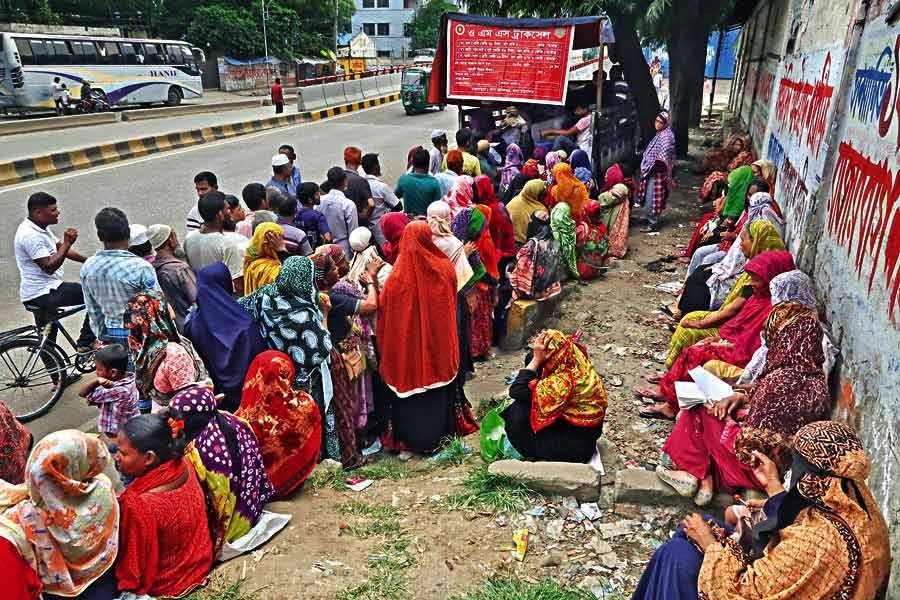Feeding the starving people by governments or private organisations is nothing extraordinary in Bangladesh. In the aftermath of devastating floods in the past, the gruel kitchens were common sights in the country. The floods have gone, so have the days and months of starvation. Enter the sale of rice, flour etc at reduced prices. The time is sequel to the corona pandemic.
Tense people standing in queues behind Open Market Sale trucks are now common in the capital. The government-run programme has made arrangements for selling at subsidised price two chief daily essentials --- rice and flour, at several points in Dhaka and the other cities. That the queues will get longer by the day is nothing unusual. They attract people, especially the economically vulnerable ones, who stand on the queues since early morning. Many reach the sales points soon after the dark of the early dawn starts clearing. The first priority on their part is placing a small visible marker as a proof of their presence. Earlier, under the mid-noon sun or during rains they had to leave the site, letting the adamant people occupy their places. The system of placing small markers like an empty bag, a piece clothing etc has ensured the people on line of getting their earlier place in the broken queues.
Placing a marker on the line is not a big deal. But getting the desired commodities after an hours-long wait is. Lack of discipline in lines snaking behind the goods-selling trucks was once a great impediment to the purchase of the subsidised products. Heated arguments followed by small bouts of quarrel once used to spoil valuable time prompting the staffers on the open truck to close down a programme prematurely. The people at the venue innovated the system of placing markers when they had to leave their places for some time. Among the crowd of poverty-stricken people, mostly women, a few of those from the lower-middle class could also be singled out. This segment of citizens doesn't go with the looks of the crowds assembled at the open market sale (OMS) points.
According to people watching the sales operations for long, the middle class, irrespective of their grades --- lower or upper, hardly discloses their families' economic status during nationwide crises. Upon being hard-pressed, they are compelled to turn to the cheaper market outlets. These spectacles filled the times in the aftermath of wars or natural calamities. In the modern times, they have become common sights in the turmoil- or disaster-hit territories.
The OMS programmes have long been in operation in Bangladesh. During the two-year corona time, and the uncertainty over food availability, the state-run agency TCB (Trading Corporation of Bangladesh) ran similar programmes throughout the country. With the ultra-poor's sources of income virtually closed, movements restricted and the external food aid declining to a trickle, the government opened the sale of essentials at subsidised prices. Undoubtedly, this programme had played a great role in helping the cities' marginalised people to keep themselves afloat.
The multi-layered reasons which are cited for the creation of a global depression coupled with inflationary pressures on food have stemmed from the Russo-Ukrainian war. Import prices of food and wheat and other essentials continue to skyrocket. Tolerably ample food harvests in the recent months, despite the impacts of flash floods, have provided the nation with glimmers of hope.
But with the Russo-Ukrainian war still raging, food prices in the country are feared to spiral out of the buying capacity of even the solvent people. Keeping this reality in mind, the nation may have to stick to its programme of subsidised commodities' sale for some more time.


